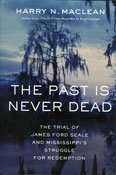With the title "The Past is Never Dead" (Basic Civitas Books, 2009, $25.95), Harry MacLean invokes the famous Faulknerian quotation: "The past is never dead. It's not even past." This theme is the foundation of the book's main narrative about the trial of James Ford Seale for the kidnapping and murders of two young black men, Henry Dee and Charles Moore, in 1964. He broadens his subject to include several redemptive themes, like the planning and dedication of a memorial to Emmett Till in Sumner, Miss.
Though MacLean lives in Colorado, he reveals a deep knowledge of our history, not just in facts and figures but in the moral and emotional implications of being the state that carries the nation's water when it comes to racial injustice. MacLean's writing is unambiguous and clear, entertaining and fast-paced. His depictions of Mississippi and Mississippians are insightful but don't really clear up the question of who we are and what we are, which MacLean knows.
In fact, he says that fundamental irreconcilability of our past, the goodness of our people and the desire to be forgiven is the "sole truth" of Mississippi. He characterizes the subtext of the Seale trial as more than the trial of a single man. It's a trial about the Klan as well, and about the state itself being complicit in kidnapping and murder by "knowingly aiding and abetting, conspiring with and furthering James Ford Seale."
MacLean is a proven true-crime writer, with a bestseller in the genre ("In Broad Daylight, "St. Martin's True Crime, 2006) and he is skilled at providing the back story of each of his characters. The development of the facts, from the crime itself, to the 40-years-late arrest, is fascinating. The appearance, personality and motivations of the defense and prosecuting attorneys, the families of the victims and the family of the accused, the key witnesses (dead and alive), the judge, the jury pool, and the final jurors are all fully developed. Even the city of Jackson is made to seem like a character in the action. Ghostlike, the reader can navigate the courtroom at will, staring into the face of the accused, noting his pallor, his age, his shrunken frame. We watch the jurors recoil from the details of the crime, especially when it's revealed that the boys, after a horrible "spanking" (the Klan term for a beating with inch-thick sticks), were chained to an engine block and metal rails and thrown into the river, alive.
It would be impossible to enjoy reading a book that dwelt constantly on these things, and MacLean seems to know it. He lives up to the title by shuttling back and forth in time. There is almost universal pleading among the jury pool and the people MacLean interviews, that the past not be dredged up yet again. It's simply too painful. And the way he skillfully recreates the atmosphere and the events of the early 1960s will lead anyone who lived through those times in Mississippi, as I did, to recall the terrorizing that went on and how scared we all were.
Yet, just as you begin to think it's overkill, he suddenly propels the action to the present, or even the future, carrying you along in his time machine. He paints an accurate picture of Mississippi today. Juxtaposed with Mississippi of the 1960s, he shows how far we've come racially and economically. He quotes some of our most beloved icons, like Willie Morris, rather than carrying the full burden of explaining Mississippi on his own shoulders. He includes interviews with numerous notable Mississippians as well as "man on the street" comments.
And he admits to feeling sad when he leaves Mississippi, which has begun to "feel like home." To explain this feeling he quotes what the legendary civil rights activist from Mississippi, Bob Moses, said to him: "When you're not in Mississippi, it's not real, and when you're there, the rest of the world isn't real."
The book is riveting, and I wouldn't have been able to put it down if it hadn't provoked such strong feelings of sadness that I had to take breaks simply to pull my head out of the past and back to the far more felicitous present. But as MacLean points out, Mississippians know better than most that "Your past is your past, after all, just as you are who you are."
Ruth Campbell Williams is a writer living in Flora, Mississippi. Read more about the case at http://www.roadtomeadville.com.
Harry MacLean will sign copies of his book at Lemuria Books in Banner Hall on October, 12 at 5 p.m. followed by a reading of his book at 5:30 p.m.



Comments
Use the comment form below to begin a discussion about this content.